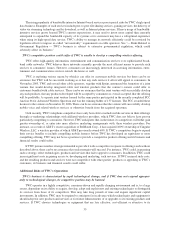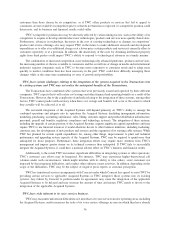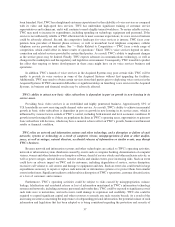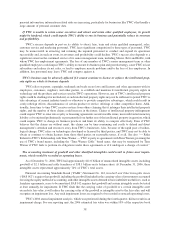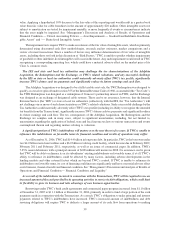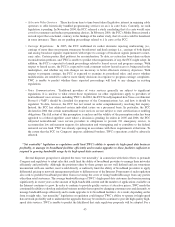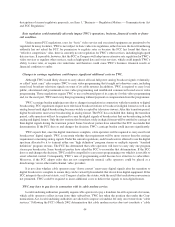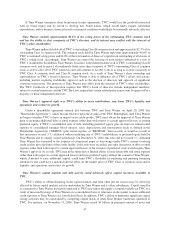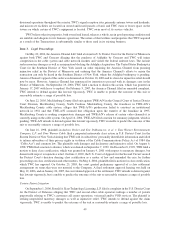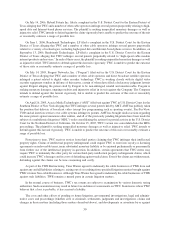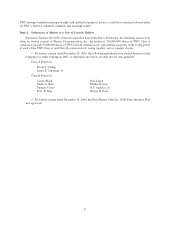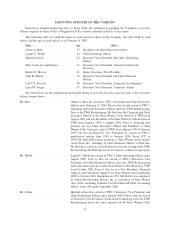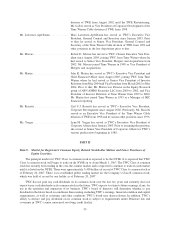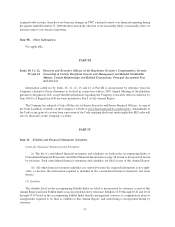Time Warner Cable 2006 Annual Report Download - page 50
Download and view the complete annual report
Please find page 50 of the 2006 Time Warner Cable annual report below. You can navigate through the pages in the report by either clicking on the pages listed below, or by using the keyword search tool below to find specific information within the annual report.service,” TWC and most other multiple system operators stopped collecting and paying franchise fees on cable
modem revenue.
The FCC has initiated a rulemaking proceeding to explore the consequences of its March 2002 order. If either
the FCC or a court were to determine that, despite the March 2002 order, TWC is required to pay franchise fees on
cable modem revenue, TWC’s franchise fee burden could increase going forward. TWC would be permitted to
collect those increased fees from its subscribers, but doing so could impair its competitive position as compared to
high-speed data service providers who are not required to collect and pay franchise fees. TWC could also become
liable for franchise fees back to the time it stopped paying them. TWC may not be able to recover those fees from
subscribers.
The FCC’s set-top box rules could impose significant additional costs on TWC.
Currently, many cable subscribers rent set-top boxes from TWC that perform both signal-reception functions
and conditional-access security functions, as well as enable delivery of advanced services. In 1996, Congress
enacted a statute seeking to allow cable subscribers to use set-top boxes obtained from certain third parties,
including third-party retailers. The most important of the FCC’s implementing regulations requires cable operators
to offer separate equipment that provides only the security functions and not the signal-reception functions (so that
cable subscribers can purchase set-top boxes or other navigational devices from third parties) and to cease placing
into service new set-top boxes that have integrated security and signal-reception functions. The regulations
requiring cable operators to cease distributing new set-top boxes with integrated security and signal-reception
functions are currently scheduled to go into effect on July 1, 2007. On August 16, 2006, the NCTA filed with the
FCC a request that these rules be waived for all cable operators, including TWC, until a downloadable security
solution is available or December 31, 2009, whichever is earlier. No assurance can be given that the FCC will grant
this or any other waiver request.
TWC’s vendors have not yet manufactured, on a commercial scale, set-top boxes that can support all the
services that TWC offers while relying on separate security devices. It is possible that TWC’s vendors will be
unable to deliver the necessary set-top boxes in time for TWC to comply with the FCC regulations. It is also possible
that the FCC will determine that the set-top boxes that TWC eventually obtains are not compliant with applicable
rules. In either case, the FCC may penalize TWC. In addition, design and manufacture of the new set-top boxes will
come at a significant expense, which TWC’s vendors will seek to pass on to TWC, but which TWC in turn may not
be able to pass on to its customers, thereby increasing its costs. TWC expects to incur approximately $50 million in
incremental set-top box costs during 2007 as a result of these regulations. The FCC has indicated that direct
broadcast satellite operators are not required to comply with the FCC’s set-top box rules, and one telephone
company has asked for a waiver of the rules. If TWC has to comply with the rule prohibiting set-top boxes with
integrated security while its competitors are not required to comply with that rule, TWC may be at a competitive
disadvantage.
Applicable law is subject to change.
The exact requirements of applicable law are not always clear, and the rules affecting TWC’s businesses are
always subject to change. For example, the FCC may interpret its rules and regulations in enforcement proceedings
in a manner that is inconsistent with the judgments TWC has made. Likewise, regulators and legislators at all levels
of government may sometimes change existing rules or establish new rules. Congress, for example, considers new
legislative requirements for cable operators virtually every year, and there is always a risk that such proposals will
ultimately be enacted. See Item 1, “Business — Regulatory Matters.”
Risks Related to TWC’s Relationship with Time Warner
Some of TWC’s officers and directors may have interests that diverge from TWC’s in favor of Time Warner
because of past and ongoing relationships with Time Warner and its affiliates.
Some of TWC’s officers and directors may experience conflicts of interest with respect to decisions involving
business opportunities and similar matters that may arise in the ordinary course of TWC’s business or the business
of Time Warner and its affiliates. One of TWC’s directors is also an executive officer of Time Warner, another is an
45


